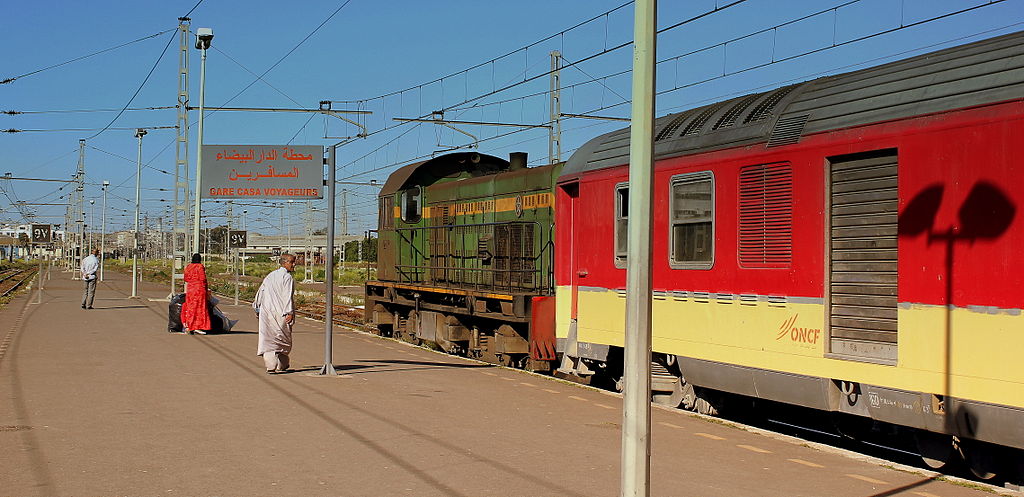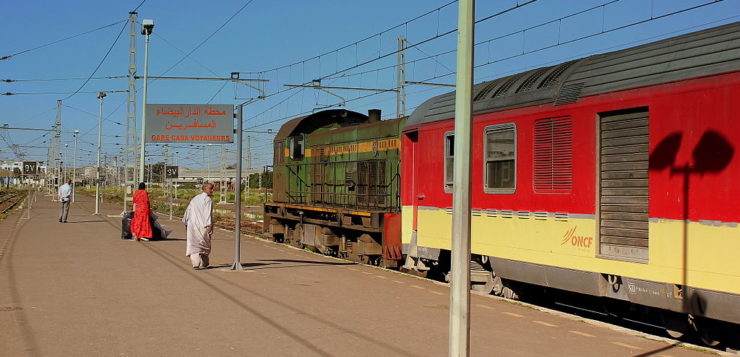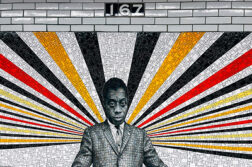
We were two men taking drags off our cigarettes, blowing smoke to mask the bathroom stench behind us—doors open, reeking of days-old piss. We had just covered the basics: “Where are you coming from?” Marrakech. “Where are you going?” Fez. ”Same, me too.”
With a smile, he then asked: “Traveling alone?
*I had been criss-crossing Morocco for the past week, and was on the second leg of my day-long train journey. I had tried making conversation in my carriage, which I shared with five other passengers, seated three along each row. I was in the middle seat. To the right, by the window of rolling green hills, a teenage couple sat across from each other, giddily giggling at their phone screens. On my left, a young father with fashionably-trimmed stubble fussed over his wife, head covered with a headscarf, and their cooing toddler, sitting directly opposite to us. While her husband grunted a few yeses and nos in English back to me, she had never once looked me in the eye. The air outside was like a mid-fall cool but inside the enclosed quarter of the carriage, stifling heat had draped its heavy coat over us.
I roamed along the length of the train, squeezing by carts of piping-hot empanada-like pastries and wild-hair musicians strumming their guitars, before finally finding my way to the dining carriage for coffee and chips. I thought of returning to my book. But my head was spinning, as though I was drowning in an ocean of words, rocking and rollicking in the waves with each rumbling jerky motion of the creaking vehicle, I parked myself instead in between two carriages—the make-shift smoking corner that I had stumbled upon.
The green blurs sped by. I was lighting my first cigarette when a short stocky man in a faded brown leather jacket approached. He asked for a spare and I obliged.
Nevertheless, when he ever-casually posed the loaded question at me, I kept my guard up. Headlines of “Solo Traveler Robbed on a Train” or “Tourist Kidnapped While Smoking” tore through my brain in those milli-seconds. Yet, I nodded in affirmation.
He continued on: “No kids?” No.
“Wife?” I shook my head.
“How about a girlfriend?” he pressed further, a gleeful grin flashing across his face now. When I again muttered no, he broke into a fit of belly-laughs as though we were two middle-aged men bonding after having been discarded by their wives at a dinner party, as though he was telegraphing: How lucky and free you must be, so unencumbered by all these worldly responsibilities.
I took another puff, before lobbing the same questions back at him.
“No, no kids. Never been married either.”
And what do you do in Fez?
“Business.”
What kind?
“Oh, a spa”.
Like a massage spa?
“Yes, yes. You like massage?”
Of course. I mean, who doesn’t?
Without missing a beat, he asked: “Would you like one?”
My sudden muteness must have conveyed my apprehension as he immediately followed up with: “No, not with me. Of course not.” Then, eyes darting around the empty carriage and voice dropping into a low whisper, he clarified himself: “I have boys. You like boys?”
I was right. This had been a pick-up after all.
But even I hadn’t expected this turn of events. Impressed as I was equally appalled, I widened my stance and smoothed out the wool of my sweater. Was I so obvious that I had given myself away? If so, should I butch it up even more, especially since I was making my way through some of the smaller towns on this trip?
While Morocco and Indonesia are two very different countries, they share many bone-wearily familiar similarities—the call-to-prayer adzan that blasted through the hotel’s windows every dawn; the common greetings of Assalamualaikum and perfunctory Insya Allah and Bismillah [may want to define the two latter terms]peppered into daily conversations; and the indisputable fact that many of us have been cruelly harassed and persecuted, if not jailed, just for being queer. Newspaper reports of George Michael’s lewd-act arrest from long-ago flashed across the screen projection of my mind. Could this man in front of me be one of those undercover cops? Was this some entrapment sting?
In response to my polite smile, he then thrusted his cell-phone into my direct line of vision. “Want to see their photos?”
With a shrug, I declined — as though telegraphing: “I’m good” — before launching into a series of questions like I was some journalist on assignment: Is the spa only for men? How long have you been running it? Lastly, are you scared? He scoffed at the last one.
He must have realized that I was no good for business by the exchange, for he soon flicked his butt on the floor before snubbing it out with the outsole of his leather shoe. “Thanks for the cigarette” he said while slipping a business card into the front pocket of my shirt before disappearing into the hall and into his carriage.
*
I didn’t call him when I got to Fez, as much as I was curious to.
The boys he alluded to never stopped haunting my imagination. Were they olive-skinned Adonises with come-hither long lashes and open-chest tight shirts displaying their bulging muscles and unabashed virility? Or were they more emaciated frail twinks in ankle-chain bondage, never seeing the light of day in some basement dungeon?
The sex-positive West Coast liberal in me immediately chided the colonialist sentiment. Why couldn’t they be proudly flamboyant men who had empowered themselves by taking on the work they could find for themselves, making the money they needed to survive and support themselves? After all, for many folks in many different parts of the world, this is still how we get to connect with one another, seeking comfort in simple carnal connections. Who was I to judge that?
Most of all, I couldn’t figure out why he had taken the risk in propositioning me in broad daylight and in public. Was it due to the fact I was traveling on my own, conspicuously yellow in the sea of dark-featured Moroccan faces? How could he have known that I wouldn’t report him to the authorities?
For the next few days, I took his card out during my smoke break—fingering the blunt corner edges that scrape against the center flesh of my palm. Yes, the encounter happened, I would remind myself. The card is real. And so are we.
Edward Gunawan is the creator of The Life Cycle of Water— a collection of video essays and cine-poems investigating queer home-making during a pandemic and Press Play— an award-winning non-fiction webcomic promoting mental health awareness (translated into six languages including Chinese and Spanish, and published as a chapbook).







